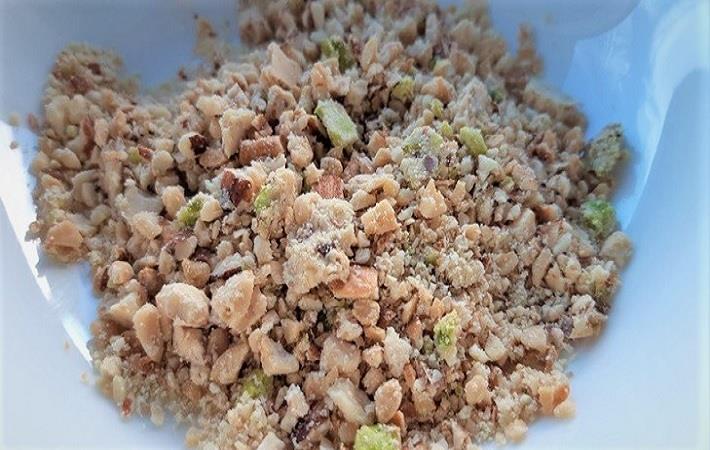Interviews
NTU team extracts antimicrobial compound from seeds
22 Jun '20
3 min read

Pic: Nanyang Technological University
Scientists at Nanyang Technological University (NTU), Singapore have extracted new antimicrobial compound from seeds, and also developed a sustainable way to extract it. This new antimicrobial compound has been used by global apparel and textiles manufacturer Ghim Li Group (GLG) as a fabric finish in their reusable masks sold locally and overseas.
The masks were distributed to Singaporeans and permanent residents last month as part of the government’s strategy to fight the COVID-19 pandemic.
The natural antimicrobial compound developed by NTU scientists contains powerful antioxidants found in seeds. In lab tests done at NTU, the compound killed 99 per cent of harmful bacteria by disrupting their cell walls.
Obtaining high-value ingredients from organic parts discarded during food processing, such as stems, seeds and husks, is an innovative way that can contribute towards a sustainable circular food economy and a key research focus of NTU’s Food Science and Technology Programme.
Using green processes to obtain these ingredients will also be more sustainable, as typical antimicrobial solutions require the use of harsh chemicals such as solvents or use ions obtained from various metals such as silver.
In contrast, Professor William Chen, director of NTU’s Food Science and Technology Programme, and his team used ball-milling, known as solid-state synthesis, with clean water processes to extract the antimicrobial compounds from the discarded husks of seeds without the need for harsh chemicals.
As the natural compound is considered non-toxic for humans, it has huge potential to be applied in other types of products, such as personal protective equipment, sports apparel, paints, and disinfectants.
With the new technology, GLG has plans to capture new business opportunities, expanding their product offerings to masks and even medical uniforms, beyond the traditional apparel products.
Research fellow Dr. Jaslyn Lee and other researchers from Chen’s team conducted lab experiments using the extracted antimicrobial liquid compound, testing it on common food pathogens Escherichia coli and Staphylcoccus aureus, which typically cause food poisoning when consumed. When in contact with bacteria, the compound binds to the bacteria wall, inactivating the protein and enzymes on the wall, thus inhibiting bacterial growth. In tests, the compound was shown to be able to create a “zone of inhibition”, where both S aureus and E coli bacteria growth were not able to penetrate this zone.
The NTU research team was initially targeting to create a new generation of sustainable anti-microbial food packaging. But following discussions with GLG, the newly discovered compound found another important application in reusable masks in this COVID-19 pandemic.
NTU senior vice president (Research) Professor Lam Khin Yong, said: “As a leading research-intensive university, NTU is proud that our research efforts have yielded a valuable resource for Singapore in the fight against infectious diseases. This innovation was an unexpected result of research in food science being applied in reusable masks used in the fight against COVID-19. This is a great example of how academia and industry can work together to create value for Singapore’s economy and help Singapore companies become more competitive.”
The masks were distributed to Singaporeans and permanent residents last month as part of the government’s strategy to fight the COVID-19 pandemic.
The natural antimicrobial compound developed by NTU scientists contains powerful antioxidants found in seeds. In lab tests done at NTU, the compound killed 99 per cent of harmful bacteria by disrupting their cell walls.
Obtaining high-value ingredients from organic parts discarded during food processing, such as stems, seeds and husks, is an innovative way that can contribute towards a sustainable circular food economy and a key research focus of NTU’s Food Science and Technology Programme.
Using green processes to obtain these ingredients will also be more sustainable, as typical antimicrobial solutions require the use of harsh chemicals such as solvents or use ions obtained from various metals such as silver.
In contrast, Professor William Chen, director of NTU’s Food Science and Technology Programme, and his team used ball-milling, known as solid-state synthesis, with clean water processes to extract the antimicrobial compounds from the discarded husks of seeds without the need for harsh chemicals.
As the natural compound is considered non-toxic for humans, it has huge potential to be applied in other types of products, such as personal protective equipment, sports apparel, paints, and disinfectants.
With the new technology, GLG has plans to capture new business opportunities, expanding their product offerings to masks and even medical uniforms, beyond the traditional apparel products.
Research fellow Dr. Jaslyn Lee and other researchers from Chen’s team conducted lab experiments using the extracted antimicrobial liquid compound, testing it on common food pathogens Escherichia coli and Staphylcoccus aureus, which typically cause food poisoning when consumed. When in contact with bacteria, the compound binds to the bacteria wall, inactivating the protein and enzymes on the wall, thus inhibiting bacterial growth. In tests, the compound was shown to be able to create a “zone of inhibition”, where both S aureus and E coli bacteria growth were not able to penetrate this zone.
The NTU research team was initially targeting to create a new generation of sustainable anti-microbial food packaging. But following discussions with GLG, the newly discovered compound found another important application in reusable masks in this COVID-19 pandemic.
NTU senior vice president (Research) Professor Lam Khin Yong, said: “As a leading research-intensive university, NTU is proud that our research efforts have yielded a valuable resource for Singapore in the fight against infectious diseases. This innovation was an unexpected result of research in food science being applied in reusable masks used in the fight against COVID-19. This is a great example of how academia and industry can work together to create value for Singapore’s economy and help Singapore companies become more competitive.”
Fibre2Fashion News Desk (SV)
Popular News
Leave your Comments
Editor’s Pick
































-Ltd..jpg?tr=w-120,h-60,c-at_max,cm-pad_resize,bg-ffffff)





.jpg?tr=w-120,h-60,c-at_max,cm-pad_resize,bg-ffffff)
.jpg?tr=w-120,h-60,c-at_max,cm-pad_resize,bg-ffffff)






